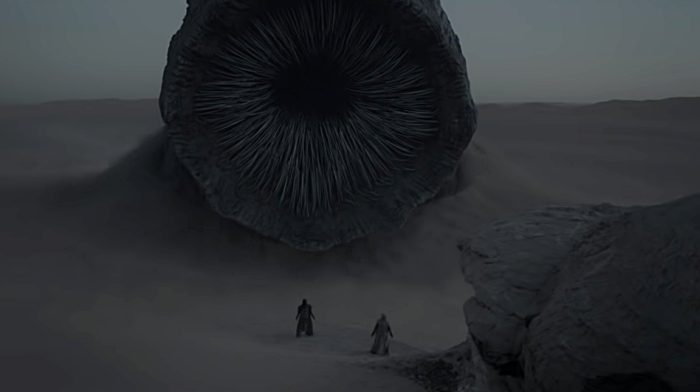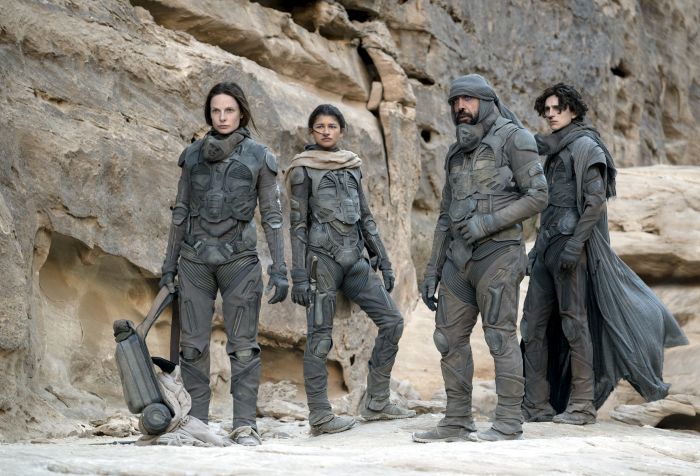Arrakis – Desert Planet – Dune
We set off on a journey to the distant future in which humanity has colonized space. Fragile peace and relative stabilization are possible thanks to the constant supply of melange, commonly known as spice or dust – a substance in appropriate doses that positively affects health, extends life, but also broadens perception. Its remarkable properties guarantee a non-declining demand, while its rarity and draconian mining conditions push the prices to sky-high values, ensuring the mineral is called not only the rarest, but also the most valuable commodity in the entire star empire. Melange mining takes place exclusively on Arrakis – a desert planet, also known as Dune. The industrial area has been managed by the Harkonnen family for years, headed by the demonic baron Vladimir (Stellan Skarsgård), however, by order of the emperor, it is soon to become a fief of the Atreides of the planet Kaladan led by Prince Leto (Oscar Isaac). The ruler’s generous gesture turns out to be on the other hand, and the boiling maneuvers and plots just below the surface inevitably lead to the imminent escalation of the conflict.

Source: htxt.co.za
Waiting for the Messiah
The desert planet has proven more than once that it does not take prisoners. Alejandro Jodorowski’s ambitious, colossally extravagant project (involving engagements by Salvador Dali, Orson Welles and Mick Jagger) never left the pre-production stage. David Lynch’s vision was created in an atmosphere of conflict between the artist and the constantly interfering studio – and although it finally hit theaters, it turned out to be an artistically unfulfilled, catastrophic financial flop, closing the way to the already planned continuation. The literary colossus of Frank Herbert thus became known as a work untranslatable into the language of film. Three decades had to pass before another daredevil was ready to take on the seemingly impossible task.
Denis Villeneuve has already become known to viewers as a visual narrator – a director who thinks in images, dressing philosophically colored plots into impressive, aesthetic frames. It was therefore fair to think that the author of the well-received New Beginning and Blade Runner 2049 would be the perfect candidate to introduce a new generation into the monumental saga of the Atreides family. One could also suspect that the Canadian, having drawn conclusions from the failures of his predecessors, but also with the support of the studio and modern technology, could turn out to be the first creator to cope with this risky task. And so it happened – his Duneit is an extremely suggestive work, synesthetically influencing all the senses. Thanks to Greig Fraser’s photos, while sitting in a dark, air-conditioned room, you can almost feel the texture of the hot, grinding sand of the Arraki desert and the irritating nostrils of spices. Balanced, monochrome frames and utilitarian economical costume designs do not, however, compromise the scale of production and ambitions behind Villeneuve’s vision. The end result, enhanced by the futuristic-tribalist soundtrack by Hans Zimmer (happily going beyond the loop of recognizable but repetitive musical motifs that has accompanied him over the last decade), is hard to call anything other than “epic” *.

Source: nbcnews.com
This is just the beginning …
Villeneuve does not succumb to the temptation to “marvel at” his work – Duna is completely focused on her own history and complex mythology, slowly and methodically introducing both new and returning viewers into the densely woven network of influences and connections ruling her own galaxy. Thanks to this, it stands out from the landscape of modern blockbusters, twins similar creatures masking the lack of autonomous identity with a network of more or less brilliant slogans, “collectibles” and pop culture references. Dune is interested only in the universe of Dune Chronicles – with all its seriousness, pathos, richness of details and panache.
On the gargantuan scale of the project, the star cast seems to fade away. The payroll is impressive: Chalamet, Zendaya, Ferguson, Isaac, Brolin, Skarsgård, Momoa, Bautista, Bardem … Individual performances must, however, give way to a common goal: a grand narrative that tries to fit hundreds of pages of detailed world-creation into an already vast, two-and-a-half hour long. As a result, individual characters may seem briefly described and insufficiently developed, while the actors themselves are forced to supplement the laconic characteristics with their own charisma. This is an unfortunate result of the detailed world presented by Herbert and the necessity to cut the source material appropriately. Villeneuve does not support himself with a bullet in the form of an off-screen narrative, letting the scenes breathe, and some details and motivations remain in the sphere of understatement, unlike David Lynch, however, he adapts only half of the first volume of the saga. The story ends with an inevitable cliffhanger, and the internal conflict tearing young Paul Atryda (fantastically portrayed by Chalamet), facing the burden of his family heritage and the burden of expectations of his surroundings, convinced of the just fulfilling prophecy about the coming savior, finds no outlet here. The themes that are likely to be the more important themes of the series are also barely mentioned – criticism of the immoderate exploitation of natural goods and environmental degradation, religious fanaticism, and the dangers of blind trust in charismatic leaders. We will wait for that **; now we can satisfy our senses and soak up the meticulously outlined and beautifully filmed, monumental world presented. In style!
* The writer of these words uses this term with full awareness of the habitual abuse of it in the context of high-budget shows.
** Just before the publication of the review, the studio officially confirmed the start of work on the continuation of Dune , scheduled for the end of 2023.
We invite you to the movie Dune to the Cinema City cinema network!

